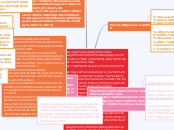1995 Quebec Referendum
- held October 30
- settled by victory for the "No"
(to separatism) side with a
50.6% against separatism and
49.4% for separatism
Parti Quebecois (1968)
- wanted to have the
the power to make its
laws and change taxes
- the "Oui" side (for separatism)
was ahead in votes for the first
referendum 6 weeks before it was
held
Shows that there were
strong opinions for
separatism in Quebec before
the 1995 Referendum
Charlottetown Accord (1992)
- another attempt to get Quebec's
consent to the Constitution Act
- many voted against the accord
- absence in their consent became
a hindrance and contributed to
their separatism
- shows what Quebec strongly
thinks, and that their opinions
hadn't changed
October Crisis (1970)
- occurred October 5, 1970
- James Cross (British trade
commissioner) was kidnapped by the FLQ
- Pierre Laporte (Minister of Immigration and Labour) was kidnapped and later killed by the FLQ
- War Measures Act was invoked
by the government
by
- controversy regarding the
government's actions towards
this issue
gov
Non-supporters say that the
disappearance of terrorism
shows public doesn't stand
for political terror (lead to
separatism later on)
1980 Quebec Referendum
- held May 20
- a vote where citizens of Quebec
chose if they were for separatism
or against
- Foreshadows Quebec's views
on separatism
- 60% was against separatism
and 40% was for separatism
(shows that like the second
vote, Quebec didn't want to
separate)
- shows that Quebec has had
issues about separatism in
the past
- support for separatism increased
in the late 1960s and the 1970s
Meech Lake Accord (1990)
- Canadian Constitution Act was
revised but Quebec did not agree
to it
- shows Quebec's different
views on political values
- Canadians were already
concerned that this would
lead to serious national
unity problems (foreshadow)
